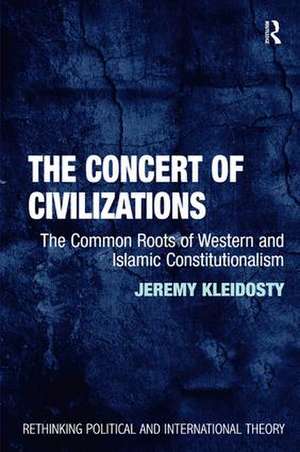The Concert of Civilizations: The Common Roots of Western and Islamic Constitutionalism: Rethinking Political and International Theory
Autor Jeremy Kleidostyen Limba Engleză Hardback – 28 iun 2015
| Toate formatele și edițiile | Preț | Express |
|---|---|---|
| Paperback (1) | 241.15 lei 43-57 zile | |
| Taylor & Francis – 16 iun 2017 | 241.15 lei 43-57 zile | |
| Hardback (1) | 766.85 lei 43-57 zile | |
| Taylor & Francis – 28 iun 2015 | 766.85 lei 43-57 zile |
Preț: 766.85 lei
Preț vechi: 1028.98 lei
-25% Nou
Puncte Express: 1150
Preț estimativ în valută:
146.76€ • 152.65$ • 121.15£
146.76€ • 152.65$ • 121.15£
Carte tipărită la comandă
Livrare economică 14-28 aprilie
Preluare comenzi: 021 569.72.76
Specificații
ISBN-13: 9781472414809
ISBN-10: 1472414802
Pagini: 240
Dimensiuni: 156 x 234 x 20 mm
Greutate: 0.6 kg
Ediția:1
Editura: Taylor & Francis
Colecția Routledge
Seria Rethinking Political and International Theory
Locul publicării:Oxford, United Kingdom
ISBN-10: 1472414802
Pagini: 240
Dimensiuni: 156 x 234 x 20 mm
Greutate: 0.6 kg
Ediția:1
Editura: Taylor & Francis
Colecția Routledge
Seria Rethinking Political and International Theory
Locul publicării:Oxford, United Kingdom
Notă biografică
Jeremy Kleidosty is currently a post-doctoral fellow on the Academy of Finland project Political Power in the Early Modern European and Islamic Worlds, at the University of Jyväskylä, Finland. He is working on a new book that profiles Tunisia's constitutional history and that of its constitutional father, Khayr al-Din al-Tunisi. Previously, he taught International Relations at the University of Sharjah, in the United Arab Emirates. He gained his PhD in International Relations from the University of St Andrews, Scotland in 2013 and researches constitutionalism and political theory. His work particularly aims to foster dialogue and fruitful avenues of reconciling different political traditions in a globalized world.
Recenzii
’This volume provides a highly inspiring discussion for scholars seeking to understand the roots and evolution of constitutionalism, freed from a Euro-centric straitjacket. A must-read work for both political scientists and historians looking for a new research paradigm in the globalized world.’ Bee Yun, Sungkyunkwan University, South Korea ’This book is path-breaking not only because it compares Islamic Constitutionalism, which theorizes legal practices of millennia old Middle Eastern states, with much younger Western jurisprudence. But also because it faces the paradox that orientalist and neo-colonial interventions have made it inconceivable to most people that the Middle East could ever have enjoyed rule of law. These neo-colonial interventions had the power to change reality on the ground with the consequence that the Arab Spring, that great rebellion against the new realities of Middle Eastern post-colonial authoritarian states, has now created a new set of realities. Is Islamic rule of law retrievable? And can it ever again be reconciled with Western jurisprudence?’ Patricia Springborg, Humboldt University, Germany
Cuprins
Introduction; Chapter 1 Constitutional Conversations—Alternative Models for the Challenge of Civilizational Conflict; Chapter 2 Western Constitutionalism—Universal Norms or Contingent Cultural Concepts; Chapter 3 From Medina to Runnymede—Comparing the Foundational Legacies of the Constitution of Medina and the Magna Carta; Chapter 4 Comparing Constitutionalisms—Is there an Islamic Constitutionalism?; Chapter 5 Constitutional Conversations—The Fusing of Political Tradition in Khayr al-Din al-Tunisi’s The Surest Path; Chapter 6 The Arab Spring—Constitutional Thought in Contested Political Space, Questions and Conclusions;
Descriere
Are Western and Islamic political and constitutional ideas truly predestined for civilizational clash? In order to understand this controversy The Concert of Civilizations begins by deriving and redefining a definition of constitutionalism that is suitable for comparative, cross-cultural analysis. The rule of law, reflection of national character, and the clear delineation and limitation of governmental power are used as lenses through which thinkers like Cicero, Montesquieu, and the authors of The Federalist Papers can be read alongside al-Farabi, ibn Khaldun, and the Ottoman Tanzimat decrees.













